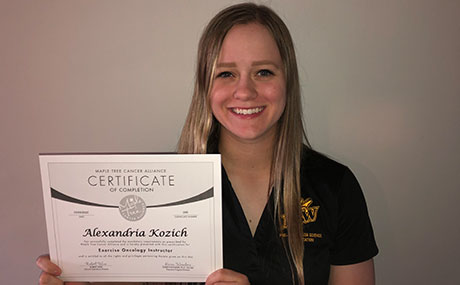Exercise science students at Baldwin Wallace University have added certified, specialized skills that will benefit cancer patients and survivors as part of the first university partnership of its kind with Maple Tree Cancer Alliance.
The new collaboration features a semester-long Health, Physical Education and Sport Sciences (HPESS) course to build knowledge of cancer, various treatments and side effects, as well as rehabilitation and exercise interventions.
The course culminates with students taking an exercise oncology instructor's certification exam administered by Maple Tree and endorsed by the National Academy of Sport Medicine (NASM).
 Fifteen
BW
students
are
the
first
to
be
certified
and
are
now
prepared
to
contribute
to
the
comprehensive
treatment
program
for
a
cancer
patient
or
survivor.
Fifteen
BW
students
are
the
first
to
be
certified
and
are
now
prepared
to
contribute
to
the
comprehensive
treatment
program
for
a
cancer
patient
or
survivor.
Students were trained on how to conduct appropriate patient evaluations using tools like the Rocky Mountain Rehabilitation Center treadmill protocol, which is specific to clients with cancer.
"A patient with active cancer in treatment or who is in remission has several factors which need to be considered in using exercise as a standard of care," explains Dr. Amy Jo Sutterluety, associate dean of health, physical education and sport sciences. "First, if the patient is in current treatment, aspects such as lymphedema, immune response and fatigue must be evaluated and exercise prescribed accordingly. A client's treatment might also increase side effects, such as cardiotoxicity or peripheral neuropathy, which would require exercise modifications."
 One
of
BW's
newly
certified
students,
Alex
Kozich
'20,
says,
"This
has
been
a
great
experience
that
has
allowed
me
to
learn
more
about
working
with
a
special
population
and
applying
that
knowledge
outside
of
a
typical
classroom
setting
to
increase
my
professional
background."
One
of
BW's
newly
certified
students,
Alex
Kozich
'20,
says,
"This
has
been
a
great
experience
that
has
allowed
me
to
learn
more
about
working
with
a
special
population
and
applying
that
knowledge
outside
of
a
typical
classroom
setting
to
increase
my
professional
background."
With more than 17 million cancer survivors living today, Maple Tree Alliance contends there is a crucial need for an appropriately trained and certified workforce to meet the need.
The BW-Maple Tree partnership is expected to continue in the fall.